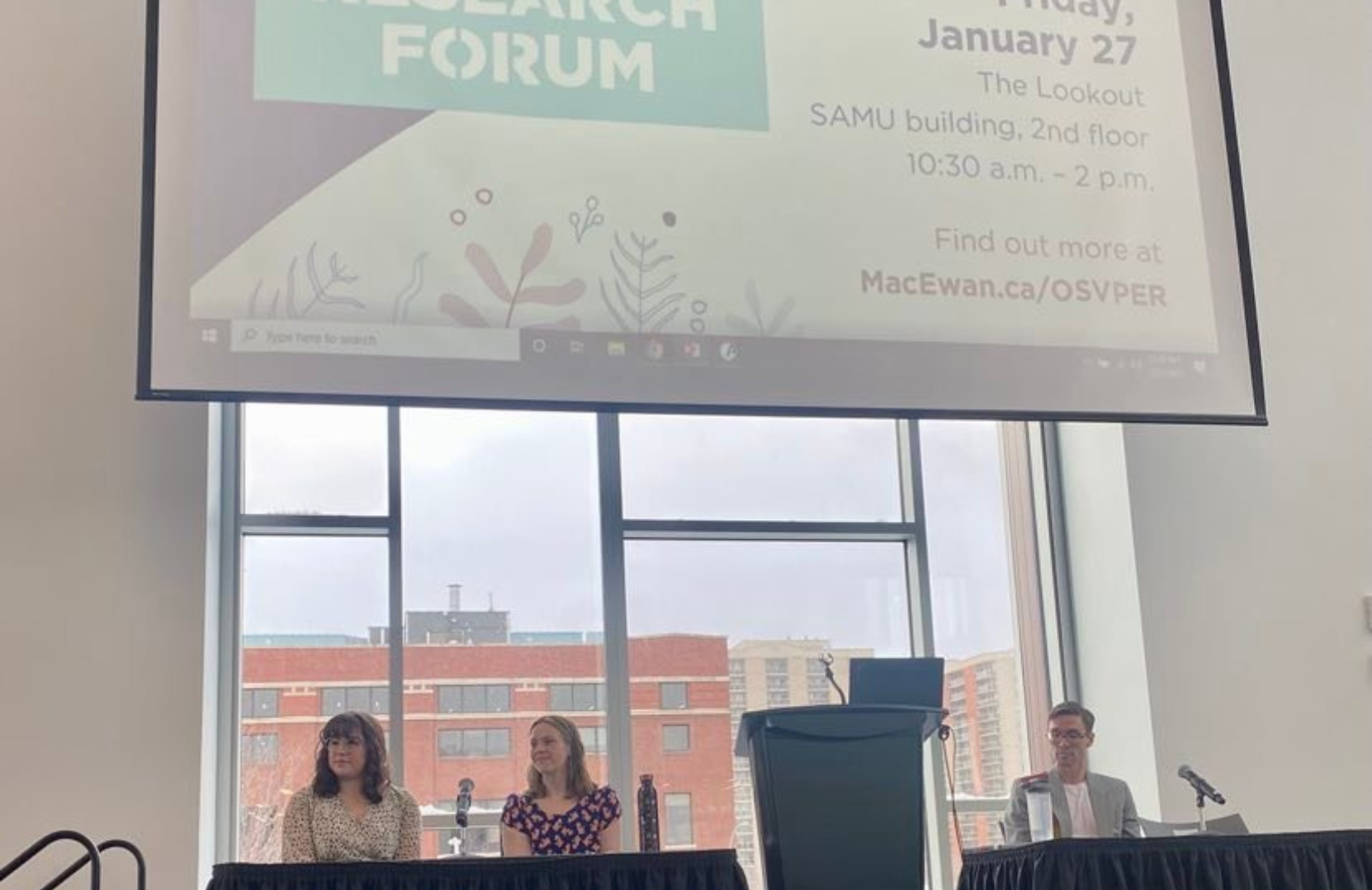TW: This article discusses sexual violence.
MacEwan University’s Office for Sexual Violence Prevention, Education and Response (OSVPER) and the Office of Research Services hosted the sixth annual Ending Sexual Violence Student Research Forum on Friday, Jan. 27, at The Lookout in the SAMU building at MacEwan University.
According to the official event page, “this forum provides an annual opportunity for students from across disciplines to present their papers, projects and creative works relating to sexual violence.”
While the forum engaged with heavy subject matter, Roxanne Runyon, the sexual violence prevention and education coordinator at MacEwan University says, “sometimes in the face of hard things and challenging issues, people’s instinct can just be to say, ‘it’s too hard,’ but I think that this event just makes (the conversation around sexual violence) accessible because it’s people who are grappling with it (sexual violence); in a way that’s hopeful.”
Runyon says they usually receive about 15 submissions in total each year and that there are opportunities for students to submit each semester. Students from all departments and faculties who do research on ending sexual violence are invited to submit.
“The goal of this interdisciplinary forum is to amplify student voices to a wider audience,” she explains.
“So often, academic work starts and ends in the classroom, and the only one who reads it might be the instructor who’s grading it,” says Runyon. “I think this forum communicates to students that ‘your ideas matter, your voice matters, and there’s so much value in what you have to say’.”
The next call for submissions will be later in the winter semester.
Six students presented this year. 2022 MacEwan honours psychology graduate Mackenzie Thomas won the $1000 award for her research entitled Differences in Criminogenic Needs and Risk Prediction Based on Sexual Assault Typology. She explains her goal is to “reduce the number of people that will ultimately reoffend.”
For her study, Thomas read 300 police case files on sexual offenders to further the research on offender management. She conducted this study while also working at the Saffron Centre in Sherwood Park, a sexual assault centre offering counselling to victims.
“It was definitely challenging,” Thomas discloses. “Seeing the dichotomy of what I was reading in the police files, like all this brutality and these really explicit details about these offenses, and then I go to work the next day and I’d see these people that are directly impacted by… similar experiences.”
Despite this, Thomas says, “I think it gave me more empathy and compassion, on both sides of the spectrum.”
Probably the most jarring statistic that Thomas shared during the forum is that only five per cent of sexual assault cases are reported to police.
Fourth-year psychology student Hailey Doucette and first-year studio arts student Ian Hanson also presented in the morning session alongside Thomas.
Doucette’s research focused on analyzing the justice system’s role in responding to sexual violence and evaluating restorative justice as a potentially better alternative. “It’s about just reestablishing or establishing a level of relational equality, even if that doesn’t mean a specific relational reestablishment between offender (and) victim.” explains Doucette.
On the whole, each presenter’s research speaks to how sexual violence is not just an individual issue, but a human one, which needs to be addressed as such.
“The larger society’s condition and discourse contributes to that singular instance (of sexual violence). So while yes, there is a cost to the specific individual victim and to… specific employers or with state court systems and justice responses, ultimately, those permeate out to so many bigger things.” says Doucette. “As long as the social context exists that perpetuates the violence, we’re retroactively going to the hospital and fixing a wound, rather than stopping people from stabbing.”
Hanson presented his work Tailored Messaging, which includes three hand-sewn, silkscreen printed embroidered jock straps entitled Feminine Mystique, Masculine Toxique, and Gender Oblique.
He discusses craft, community, and activism. His piece seeks to challenge gender performance and expectations. In Feminine Mystique for example, Hanson hand embroidered three different flowers onto the jock strap fabric. Daffodils, Lily of the Valley, and Foxgloves. All of those flowers are pretty and dainty, yet poisonous, thereby challenging the notion that feminine is synonymous with weak.
“So much about craft is about community,” says Hanson. He also explains that choosing the shocking imagery of a jockstrap was intentional. It gets people talking.
At the end of the presentation session, there was a panel where audience members were invited to ask the presenters more about their research.
Hanson was pleasantly surprised by the audience participation during the Q&A.
“I’ve never spoken as an artist; it’s something entirely new to me,” Hanson explains. “It was so nice getting questions from an audience that gives a damn and getting on people’s wavelength and engaging… as an artist.”
After the first panel, there was a short lunch break and a chance to chat more with the presenters and peruse some of the educational materials on display from OSVPER.
The second group of presenters included fourth-year criminology student Alyssa Dechant and sociology students Rayyah Sempala and Jessica (Jess) Voelker.
Voelker first shared her research about online violence, which is very prevalent on the streaming platform, Twitch. Her research adds to the pool of studies on victims of violence online.
“Unfortunately, a lot of (the research) has come from those who have been impacted, but I think just raising awareness on the issue definitely helps, and I think just listening to the victims.” Voelker comments.
Voelker underlines the importance of framing these online cases of assault as violence, rather than a disconnected, shrugged off, internet problem.
Voelker’s research and conversations with Twitch streamers culminates in a podcast titled Online Violence on Twitch. Listeners can expect to hear how these attacks, such as hate raids, swatting, or doxing, can have a significant, lasting, and potentially deadly impact, especially for streamers who rely on Twitch for their income.
Sempala was the second-last presenter. Her work is entitled Methods of Resisting Gender Violence: Dance as a Form of Reclamation. She discussed how, through embodiment and acknowledging the intersectional identities people have, we can disrupt the spaces where gender violence is perpetuated.
As an example, Sempala shared a video of her dancing a traditional Ugandan dance. She spoke on how dance can be a disruptive form to reclaim space. On an individual level, Sempala says the dance makes her feel “liberated.” When sharing the dance with family, Semapla describes it as a community and “a joyful celebration.”
“Historically, people don’t see it as a sexual dance, but more of a celebratory dance. And I think in that way, different forms of dance…reclaim the narratives that are put on bodies.” Sempala says.
During the presentation, Sempala brought up the historical hypersexualization of Black women in American/Canadian hip hop. Sempala maintains she does not want to resist this narrative, but rather integrate it with the narrative of her own cultural celebration.
Lastly, Dechant presented her research on sexual violence in prisons, and the need for prison reformation. Historically, sexual violence has been used to dismantle communities. In highly matriarchal Indigenous communities, colonial violence dismantles women.
Dechant urges listeners to deconstruct Canada’s nationalist discourse of sexual exceptionalism. In Canada, 40 per cent of women in federal prisons are Indigenous, even though in 2021, Statistics Canada reported the Indigenous population to only make up five per cent of Canada’s overall population.
Seventy per cent of federally sentenced women have been sexually assaulted in their lifetime. Strip searches, in their very essence, do not allow for consent. This is why Dechant classifies state-imposed and sanctioned sexual violence as a form of rebranded violence.
To stop perpetuating this violence Dechant offers de-incarceration as a first big step. “There are a lot of nonviolent first-time offenders within our prison system. Getting them out and getting them into the community would be a massive step forward,” she explains.
Overall, the 2023 Ending Sexual Violence Student Research Forum was an important and educational event that showcased what MacEwan students are capable of. The six students served a jarring reminder of the prevalence of sexual violence in our society.
One big takeaway was the fundamental need for change to our culture that perpetuates sexual violence, starting with addressing the lack of sexual assault services.
The Saffron Centre in Sherwood Park where Thomas works has a wait time of two to three months.
Currently, for those who take the brave first step of asking for help, the waitlist for seeing a clinician at the Sexual Assault Centre of Edmonton (SACE) is between 12 to 15 months. “That’s considering that we have 15 clinicians on staff, seeing four to five clients a day… We still do eight, to 10, to 12, intakes a day. That’s how many people are reaching out to us for help,” says MJ James, CEO of SACE.
Roughly a 10 minute drive from Macewan, SACE is one of the 15 branches in Alberta under the umbrella of Alberta Sexual Assault Services (AASAS). James mentions how her branch is not the only one experiencing difficulty. “I think that the issue of sexual violence is at a crisis point. Both in terms of incidences of it and the demand for services far exceeding our capacity to be there,” says James. “The resiliency that we have is because of the passion that we have for this issue and we will never give up. We will never leave those people alone. We will always be here for them. They have a voice.”
1.8 million Albertans have experienced sexual abuse in their lifetime. That is 43 per cent of Alberta’s population —– almost one in every two people.
If you or someone you know needs help, James recommends calling the Alberta Crisis Line (1–866-403-8000), or SACE at their local line (780-423-4121), which is open from 9 a.m. to 9 p.m.
On campus, the Office of Sexual Violence Prevention, Education, and Response can be found in Room 6-213. Additionally, you can call them at 780-633-3268 or email osvper@macewan.ca.





0 Comments